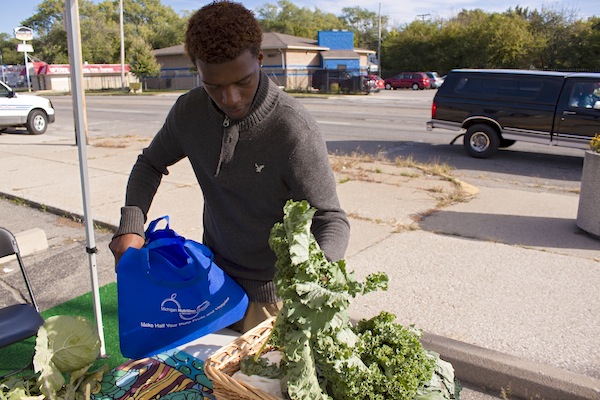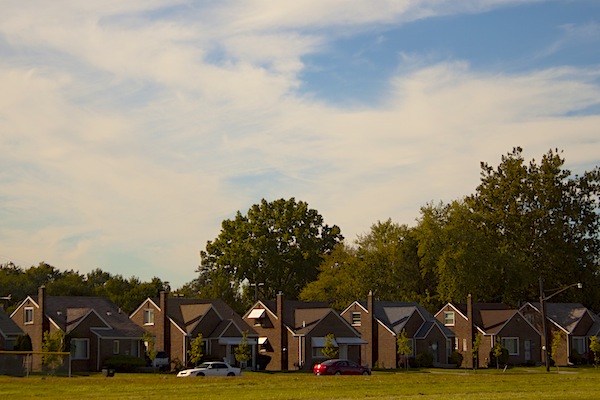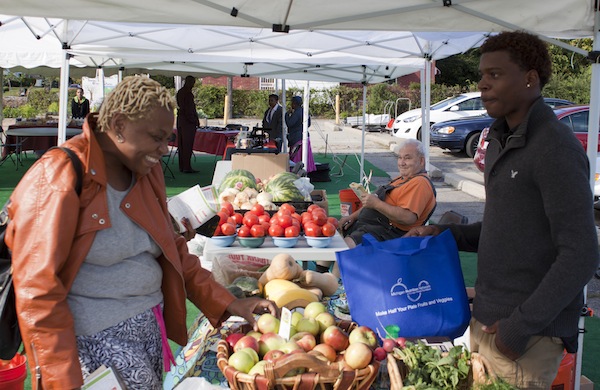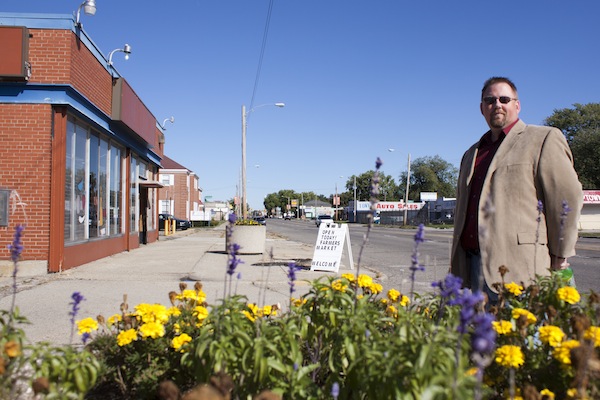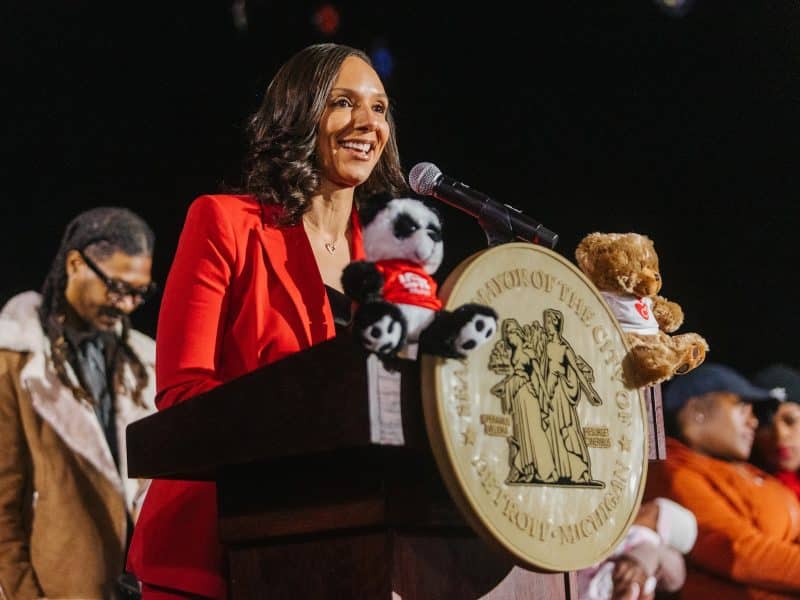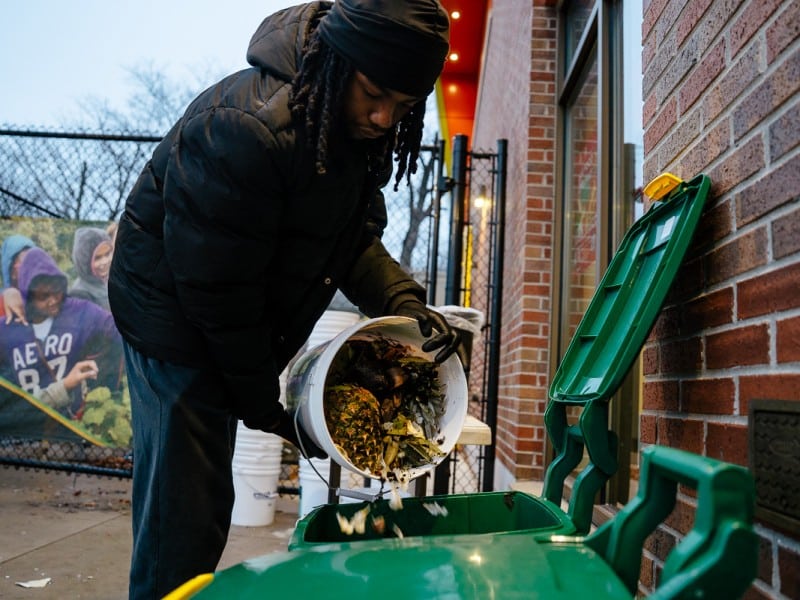Detroit by District: The promise of the Joy-Southfield community
This West Side neighborhood embraces healthy living practices, including a clinic for residents without insurance and a farmers market where produce from community gardens is sold. Matthew Lewis takes a tour with Rodney Gasaway of the Joy-Southfield CDC.
Joy Road is a bustling thoroughfare on Detroit’s West Side that runs through the Cody-Rouge neighborhood in the city’s new Council District 7. Named for Henry Bourne Joy, a Detroit industrialist who was responsible for moving the Packard Motor Company to Detroit from Ohio while he served as company president, the road once evoked the emotion joy rather than the person. The song “Joy Road” by the San Remo Golden Strings gives you an idea of how the area was viewed in the mid 60s. Fast forward a few decades and Joy Road is still the subject of musicians’ fascination, evoking different, less positive emotions (Listen: “I’m from Joy Road” by Jesse James, K-Doe, and T Woody).
But the Joy-Southfield Community Development Corporation is working hard to turn the Joy Road corridor into a joyful place to live. They are doing this through initiatives aimed at improving the health of residents of the community. “Our main goal is to close the racial and ethnic health disparity gap,” says Rodney Gasaway, Director of Community and Economic Development at Joy-Southfield CDC. “83,000 African Americans die each year because of health disparities. We’re asking, ‘Where’s the outrage?'” Joy-Southfield Executive Director Dr. David Law frames it this way: “Elimination of health disparities should be the priority of the modern civil rights movement.”
The organization was founded by Second Grace United Methodist Church in 2001 as a mini health clinic serving uninsured residents of the neighborhood. Since then, the organization has grown the clinic dramatically. “Our clinic is not big, but we can do a lot,” says Gasaway. Last year, over 3,200 adults visited the clinic and received free health care. Over 8,000 prescriptions worth over half of a million dollars were written at the clinic in 2012. The clinic prides itself on its ability to measure health outcomes through its IT system, which Gasaway notes leads the way for clinics of its type.
In recent years, however, Joy-Southfield has embraced a model that views healthy living as something that requires much more than access to care. They have launched several place-based initiatives dedicated to improving the physical environment in the neighborhood. They call it an “ecological approach to promoting health equality.”
“Only 20 percent of health equity outcomes are related to access to clinical care,” says Gasaway. Other factors include health behaviors (30 percent), which Joy-Southfield addresses with education sessions held throughout the community, social and economic factors (40 percent), which they are addressing through economic development initiatives, and the physical environment (10 percent), which they are addressing through the creation of complete streets.
While the clinic is still going strong, Joy-Southfield CDC has several projects underway that are aimed at complementing those services. One is their Tuesday farmers market (located at 18900 Joy Road), at which produce grown in three of Joy-Southfield’s community gardens is sold alongside produce sourced from Eastern Market and non-food goods made by local artisans.
Recently, Joy-Southfield partnered with Wayne State University’s Master of Urban Planning program to produce an economic development strategy for the neighborhood entitled “Going Green for Growth.” The report outlines ways in which the neighborhood can experience economic and community health benefits by transforming itself into one of the greenest neighborhoods in the city by attracting green industry (they have identified multiple properly zoned light industrial buildings suitable for green industry) and creating complete streets and a more walkable environment.
When taking on this project, Joy-Southfield underwent an extensive community visioning process. “We asked ourselves, ‘What are we? What makes us different?’ and we decided that we wanted to become the greenest neighborhood in the city of Detroit,” says Gasaway. “You cannot develop resources in a community and expect people to flock there unless there’s a community driven process and people are empowered.”
In 2010, Joy-Southfield was the only neighborhood in the city of Detroit to receive The Michigan State Housing Development Authority’s (MSHDA) Downtowns of Promise grant, which is helping them improve commercial businesses on Joy Road through facade improvements.
Gasaway coordinates an extensive volunteer program which provides neighborhood residents with free home repairs. Part of Joy-Southfield’s efficacy derives from its volunteer coordination. The clinic works so well because it attracts medical professionals from around the region to donate their time and services.
Rodney Gasaway is a driving force behind this. He serves as a board member of Community Development Advocates of Detroit‘s Caucus 7, a position he pursued as a way to connect with other community development leaders throughout the city. He also leverages volunteer hours from the Methodist community in Southeast Michigan, in which he is a confirmed candidate for ordination.
“My calling is social justice,” says Gasaway, who grew up in a small river town in southern Indiana with a population of 400. “I didn’t meet a person of color until I was 16. Then I joined the Navy and served in Desert Storm. I saw the world, the worst and the best of it, and felt the calling to help change it.”
Matthew Lewis is project editor for this series, which runs until the General Election in November.
